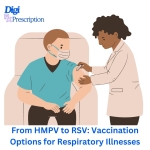
From HMPV to RSV: Vaccination Options for Respiratory Illnesses
Respiratory illnesses such as Human Metapneumovirus (HMPV), Respiratory Syncytial Virus (RSV), and influenza are significant public health concerns, especially during seasonal peaks. While vaccines have historically played a vital role in combating respiratory illnesses like influenza, advancements in vaccine technology are paving the way for broader protection against other respiratory viruses, including RSV. In this blog, we’ll explore the current vaccination options for respiratory illnesses and the future of immunization against viruses like HMPV.
1. The Role of Vaccines in Preventing Respiratory Illnesses
Vaccines are designed to prepare the immune system to recognize and combat pathogens, significantly reducing the severity of infections or preventing them altogether. They are particularly crucial for:
- High-risk populations, such as children, older adults, and those with compromised immune systems.
- Reducing hospitalizations and deaths related to respiratory infections.
- Minimizing the overall burden on healthcare systems during flu and virus seasons.
2. Current Vaccination Options for Common Respiratory Illnesses
a. Influenza (Flu) Vaccines
- The flu vaccine is one of the most widely available and effective vaccines for preventing seasonal influenza.
- Updated annually to target the most prevalent strains.
- Recommended for nearly everyone aged 6 months and older.
b. RSV Vaccines
- RSV vaccines have recently been developed to target this common respiratory virus that affects young children and older adults.
- FDA-approved vaccines for older adults, such as Arexvy (by GSK) and Abrysvo (by Pfizer), have shown significant efficacy in reducing RSV-related hospitalizations.
- Monoclonal antibodies like nirsevimab (Beyfortus) are used in infants to provide passive immunity against RSV.
c. Pneumococcal Vaccines
- Protect against bacterial infections caused by Streptococcus pneumoniae, which can lead to pneumonia, meningitis, and other complications following respiratory viral infections.
- Available in two main types: PCV (Pneumococcal Conjugate Vaccine) and PPSV (Pneumococcal Polysaccharide Vaccine).
d. COVID-19 Vaccines
- COVID-19 vaccines have revolutionized protection against severe respiratory infections caused by the SARS-CoV-2 virus.
- Regular boosters are recommended for high-risk groups to maintain immunity.
3. Vaccines in Development for HMPV
Unlike RSV or the flu, there is currently no approved vaccine for Human Metapneumovirus (HMPV). However, research is underway to develop an HMPV vaccine:
- Scientists are exploring mRNA vaccine platforms (similar to COVID-19 vaccines) to create effective immunization strategies.
- The focus is on creating vaccines for at-risk populations, such as young children, older adults, and individuals with underlying health conditions.
4. The Importance of Vaccination for High-Risk Groups
Certain populations are more vulnerable to severe respiratory illnesses and benefit greatly from vaccination:
- Infants and young children: More susceptible to viruses like RSV and HMPV due to underdeveloped immune systems.
- Older adults: At higher risk of complications from respiratory viruses due to age-related immune decline.
- Individuals with chronic illnesses: Such as asthma, diabetes, or heart disease.
- Pregnant women: Vaccination helps protect both the mother and the unborn child.
5. The Future of Vaccination for Respiratory Illnesses
a. Universal Respiratory Virus Vaccines
- Researchers aim to develop a universal vaccine to target multiple respiratory viruses, including RSV, HMPV, and influenza.
b. mRNA Vaccine Technology
- The success of mRNA vaccines for COVID-19 has opened doors for rapid development of vaccines for other respiratory illnesses.
c. Combination Vaccines
- Efforts are underway to create combination vaccines that protect against multiple respiratory pathogens in a single dose.
6. Supporting Immunity Beyond Vaccines
While vaccines are crucial, additional measures can complement their effectiveness:
- Maintaining good hygiene: Regular handwashing and mask-wearing during peak seasons.
- Strengthening immunity: Eating a nutrient-rich diet, staying hydrated, and exercising regularly.
- Using telemedicine: Reducing exposure to sick individuals by consulting doctors online for minor illnesses.
Conclusion
Vaccination remains one of the most powerful tools for preventing respiratory illnesses and their complications. While vaccines for influenza, RSV, and pneumococcal infections are widely available, the development of vaccines for HMPV and other emerging viruses promises a brighter future for respiratory health. As technology advances, the integration of innovative vaccines and preventive strategies will continue to enhance public health outcomes worldwide.
- 2
-

* * * <a href="http://vandl-reddevil.com/uploads/k2qh58.php?3s0wjz">Get Free Bitcoin Now</a> * * * hs=2e463bc797ab7ebecaeb27faafbd3b9d* 3 months ago
18tshi
-

* * * Win Free Cash Instantly: http://vandl-reddevil.com/uploads/k2qh58.php?3s0wjz * * * hs=2e463bc797ab7ebecaeb27faafbd3b9d* 3 months ago
sot55v
